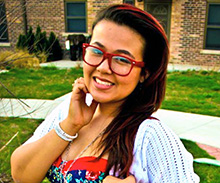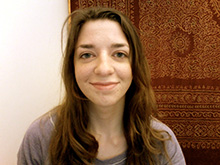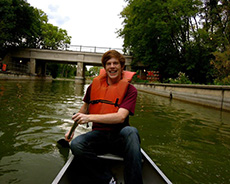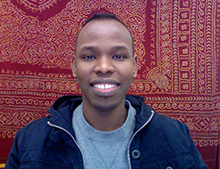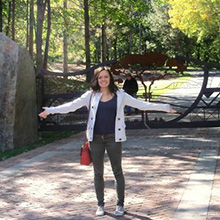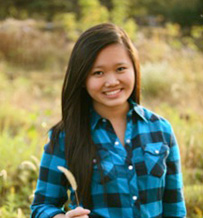This is a continuation of a series of articles on hybrid courses. The series began with an interview with Dan Soneson, who coordinates the Hybrid Working Group, followed by the Spanish Hybrid article.
With the debut of French 1004 in Fall 2011, French was the second language program to offer lower-level hybrid courses. Since then, curriculum developers have experimented with different proportions of weekly face-to-face meetings with online components at the 1003 and 1004 levels. French 1002 was added as a hybrid course this spring.
One of the most exciting developments in hybrid French 1004 is the integration of TandemPlus class-to-class exchanges between U of M French students and English learners from Troyes, France. Students are assigned to communicate via Skype with their language partners on predetermined topics that complement the themes covered in the curriculum.
Trina Whitaker, French 1003/1004 coordinator and instructor, said "This is, for many students, a very positive experience."
Corbin Treacy, a French 1004 hybrid instructor, also described the online webcam activities as a positive experience for students. "My students got a lot out of the Skype exchanges," he said. "One student traveled to France over the summer and stayed with her exchange partner; other students have told me they are still in contact with their 'correspondent.'"
Experimentation with French Hybrid Format
Rick Treece taught a traditional five-day-a-week French 1004 class this fall. On the first day, he asked students how often they would like to meet, while maintaining the same five credit load. The majority responded that they would like to meet four days in-person and one day online. Treece then revised the syllabus to the four-day-a-week format (4+1), with an optional day when work could be done face-to-face if the students chose to.
Treece found that there was relatively high attendance on the optional days, with over half attending. However, most of his students had expressed interest in continuing past French 1004, which was not typical of other classes. Students who plan to continue studying the language beyond 1004 tend to be more intrinsically motivated.
For instructors and students alike, certain French hybrid formats require more work. This Spring semester, Whitaker is teaching a 4+1 hybrid course after teaching 3+2 hybrid. "I am frankly shocked at how much less time I have to spend on my teaching, when the class meets more often," she said. "The 3+2 classes are a lot more work - there is more grading, more planning... just more of everything that takes a lot of time."
Hybrid French 1002 course, introduced this fall, utilizes the software Connect, a new hybrid interface for the textbook Deux Mondes.
Reactions to Hybrid Content
The French hybrid format allows instructors to experiment with content to engage students. Treece was surprised by students' reactions. "Results didn't always match my expectations: a session on use of online translators, which I expected to be wildly popular, only attracted 4 students."
During the first semester of French hybrid, students could do work based on the individual's level of skill in French, but it did not always relate directly to the course content. This method included using separately purchased software based on readings, video, audio and grammar exercises, Whitaker said.
"There was a disconnect between what the students were being asked to do outside of class and what we were doing in class," Treacy said. "Initially, they liked the concept of independent learning, increased flexibility, and targeted online linguistic support. Before long, however, students began to look upon the online exercises as burdensome and arbitrary."
"Things that seem to work better," Whitaker said, "are having students do readings or watch videos that we select within the department and can make sure are entirely relevant to our course content."
Best Personalities for Hybrid
Whitaker found that, for students motivated and strong in French, hybrid is successful and adds extra motivation. However, she said, "students who are less strong in French, or who are not motivated, can find that the course feels like a lot more work to them." Whitaker explained that for a student who is used to the traditional format, which allowed more reliance on peers and instructors to answer questions, he or she is less successful.
"When students are doing the hybrid work, they are on their own, and they must do their best to figure things out without outside help, without relying on others. So it makes sense that it's taking more time [for these students], even if in reality the same amount of time is going by on the clock - it is more intensive time." - Trina Whitaker
Treacy agreed. "It requires a student who can learn independently and engage meaningfully during the hybrid section's more limited class time. Students who require constant, cyclical instruction, and who need more accountability, seemed to struggle in the hybrid section I taught."
Though the French hybrid format requires a motivated student, it also requires concise instruction. Treacy said, "The adjustment required me to be more organized and thoughtful with class time. Particularly difficult was the balancing act between responding to specific student needs (reviewing a tricky concept, for example) and moving forward with new material."
Treece also mentioned that hybrid courses require a special type of student and instructor. "One of the recurring topics in our Hybrid Teaching Work Group has been consideration of what instructional talents, skills and preferences hybrid and online teaching demand or favor vs. face-to-face teaching."
Hybrid caters to a new generation of online learners. Treece noted, "As we begin to face a new generation of learners who have been learning online their whole lives (and who therefore are comfortable with that sort of instructional delivery and competent in that setting), we hope that we will have bred a new generation of teachers trained in that style of teaching and equally familiar with and comfortable with online learning."
Future Goals
Treacy expressed hope in French hybrid as it improves content in the future, despite student's occasional hang-ups related to content:
"I recall that on a mid-course evaluation, students expressed a simultaneous frustration with the specific forms of the online exercises and an appreciation for the hybrid concept. Despite their struggles to integrate in-class learning and
out-of-class online study, the students overwhelmingly reported they would take a hybrid course in the future."
-Corbin Treacy
Treece described a student's experience with the independence and accountability of the French hybrid format.
"I had a point of clarity when I asked a class about their experience with a (new) video assignment we were piloting. A student remarked that she had gotten a lot more out of it by being forced to do the work on her own. She said that if I had shown the video in class, she would probably have zoned out and waited for other members of her small group to take up the slack, but at home faced with her computer and the worksheet, there was no one else to do the task, so she worked through it herself." - Rick Treece
In addition to continuing the current French 1002 hybrid 4+1 format, Treece said the hybrid French 1003 4+1 format will most likely expand to all day sections in Fall 2013 and will primarily include online video.
